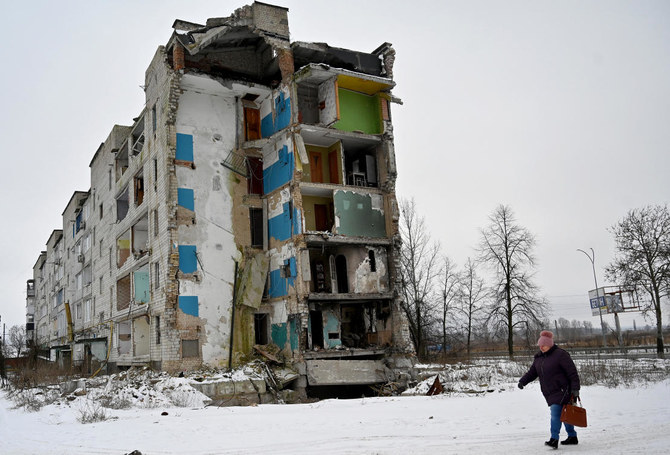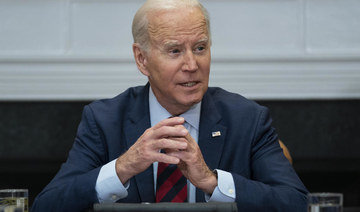KYIV: Russia launched a rush-hour barrage of missiles toward Ukraine on Thursday, the day after Kyiv secured Western pledges of dozens of modern battlefield tanks to try to push back the Russian invasion.
Moscow had reacted with fury to the German and American announcements, and has in the past responded to apparent Ukrainian successes with air strikes that have left millions without light, heat or water.
The Ukrainian military said it had shot down all 24 drones sent overnight by Russia, including 15 around the capital, with no damage reported.
But soon afterwards, air raid alarms sounded across Ukraine as people were heading to work, and senior officials said air defenses were shooting down incoming missiles.
In the capital, crowds of people took cover in underground metro stations, and a loud explosion was heard.
DTEK, Ukraine’s largest private energy producer, said it was conducting emergency power shutdowns in Kyiv, the surrounding region and also the regions of Odesa and Dnipropetrovsk because of the imminent danger.
Kyiv’s military administration said more than 15 missiles fired at Kyiv had been shot down, but urged people to remain on shelters.
“Missiles are flying inside the territory of Ukraine. At least two northwest through Mykolaiv region,” Vitaly Kim, governor of the Mykolaiv region in southern Ukraine, said on the Telegram messaging app.
An air force spokesman said impacts had been registered in the central Vinnytsia region.
Western analysts say the attacks on Ukraine’s cities are more an attempt to break morale than a strategic campaign.
Both sides are expected to mount new ground offensives come the spring, and Ukraine has been seeking hundreds of modern tanks in the hope of using them to break Russian defensive lines and recapture occupied territory in the south and east.
Both Ukraine and Russia have so far relied primarily on Soviet-era T-72 tanks.
“The key now is speed and volumes. Speed in training our forces, speed in supplying tanks to Ukraine. The numbers in tank support,” President Volodymyr Zelensky said in his nightly video address on Wednesday.
“We have to form such a ‘tank fist’, such a ‘fist of freedom’.”
Drumbeat of requests
Maintaining Kyiv’s drumbeat of requests, Zelensky said he had spoken to NATO Secretary General Jens Stoltenberg and asked for long-range missiles and aircraft.
Ukraine’s allies have already provided billions of dollars worth of military support, including sophisticated US missile systems that have helped turn the tide of the war in the last six months.
The United States has been wary of deploying the difficult-to-maintain Abrams but had to change tack to persuade Germany to send to Ukraine its more easily operated German-built Leopards.
Germany will send an initial company of 14 tanks from its stocks, which it said could be operational in three or four months, and approve shipments by allied European states with the aim of equipping two battalions — in the region of 100 tanks.
The Leopard is a system that any NATO member can service, and crews and mechanics can be trained together on a single model, Ukrainian military expert Viktor Kevlyuk told Espreso TV.
“If we have been brought into this club by providing us with these vehicles, I would say our prospects look good.”
US President Joe Biden said the 31 M1 Abrams tanks that Washington will provide posed “no offensive threat” to Russia.
But Sergei Nechayev, Russia’s ambassador to Germany, on Wednesday called Berlin’s decision “extremely dangerous,” saying that it “takes the conflict to a new level of confrontation.”
Since invading Ukraine on Feb. 24 last year, Russia has shifted its publicly stated goals from “denazifying” and “demilitarising” its neighbor to confronting a purportedly aggressive and expansionist US-led NATO alliance.
The Russian invasion has killed thousands of civilians, forced millions from their homes and reduced entire cities to rubble.
The heaviest fighting for now is around Bakhmut, a town in eastern Ukraine with a pre-war population of 70,000 that has seen some of the most brutal fighting of the war.
Ukraine’s military said Russia was attacking “with the aim of capturing the entire Donetsk region and regardless of its own casualties.”
The Russian-installed governor of Donetsk said on Wednesday that units of Russia’s Wagner contract militia were moving forward inside Bakhmut, with fighting on the outskirts and in neighborhoods recently held by Ukraine.
Reuters could not verify the battlefield reports.
Russia launches wave of missiles at Ukraine after Kyiv secures tanks
Short Url
https://arab.news/2q8ar
Russia launches wave of missiles at Ukraine after Kyiv secures tanks

- In the capital, people sheltered in a metro station
- Overnight, the military said its anti-aircraft defenses had shot down all 24 drones sent by Russia















